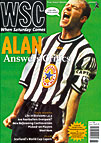 With huge numbers of fans travelling to France without any hope of getting a ticket, the process is clearly favouring the rich and famous. Without a system change, the streets of Paris could be full of angry fans from all nations. A recipe for disaster?
With huge numbers of fans travelling to France without any hope of getting a ticket, the process is clearly favouring the rich and famous. Without a system change, the streets of Paris could be full of angry fans from all nations. A recipe for disaster?
You'll remember the advert broadcast before the England v Chile friendly in March. After running down a list of the qualities to be found in the England squad, the narration ended in a sneering challenge: “Come on Chile, the boys are waiting.” It could just as easily have been an invitation to a fight as a football match. As a symbol of arrogance headed for a fall (you’ll recall the result too), it was a neat example of how the build-up to this World Cup has gone.
Clearly the ticketing procedures for France ’98 could have been handled much better. But the waves of abuse heaped upon the World Cup organisers by press and politicians are themselves symptomatic of some disturbing trends. On the one hand, much of the criticism has been misdirected, not to mention hypocritical. On the other hand, the unhealthy coalition of interests that has demonized the French organisers promises worse to come when the tournament actually gets under way.
The system in use for France was first announced two years ago to absolutely no fuss whatever. Now, scarcely a day goes by without an outpouring of rage that the French should stage a football tournament for which they expect to get the lion’s share of the tickets. Yet the host nations did the same in the past two World Cups, and at Euro ’96. Surely one of the perks of staging a World Cup is that large numbers of people who live in the host country will get to see a lot of matches. That is the basis upon which the FA will attempt to rally public support for their (doomed) bid to stage the 2006 World Cup. Imagine the outcry then if the European Union acted on demands from the French and German FAs that more tickets should be made available to their supporters. It might even be enough to resuscitate the Referendum Party.
In the wake of the recent shouting match, UEFA have announced that ticket distribution for the Euro 2000 finals will be modified, with a bigger proportion of tickets being spread among the national associations of the qualifying countries. No word, though, on whether they intend cutting back on the tickets passed on to sponsors and the organisers of corporate entertainment pack-ages. For France ’98 the major sponsors received over 300,000 tickets between them – nearly 15 per cent of the total – while private businesses acquired a further 230,000. Our own FA have been strangely silent on this subject too.
Yet the football authorities have been allowed to pose as the fans’ friend by making insistent claims for more tickets at every turn – regardless of the fact that their own proudly trumpeted system of ensuring tickets went only to members of the England Travel Club was massively subverted by the first-come, first-served anarchy of the famous hotline. The legitimate concerns of fans over tickets have been effectively redirected away from the corporate freeloaders towards “the French”.
At the same time, both the FA and the government insist that fans without tickets should not travel to France, and have refused to fund the FSA fan embassies, which have proved their worth at previous tournaments. As fan organisations have wearily pointed out, all the available evidence suggests that the more England fans travel to foreign parts, the more the hardcore hooligan element is diluted and a more congenial atmosphere encouraged. The French tourist board and the various host cities which have been busily planning fan-friendly events could be excused for feeling a bit miffed that their well-meaning (and completely sensible) efforts have been so frostily rebuffed.
Whereas in past tournaments – most notably Italia ’90 – England fans have become used to being cast primarily as hooligans, the ticketing row and other pre-World Cup publicity has revealed a more complex, but not necessarily more healthy, situation this time around. Now that football is chic, everyone wants to be seen to be identifying with the fans, or at least with a certain type of fan. Hence the official stance on tickets, the unrelenting boorishness of adverts aimed at the football market (Carling’s recalls Euro 96 and “the day we stuffed the Dutch”) and the industry which has been built up around nostalgia for the violence of the past – witness the recent crop of reactionary garbage presented as football fiction by major publishers.
The worst-case scenario is that many ticketless England fans will heed the FA’s advice not to travel, but many more will not, and among those will be those most likely to cause trouble. If they fail to secure tickets (or perhaps if England simply do badly), it’s all too easy to imagine antagonism towards their French hosts, so carelessly vilified by authorities and media alike, turning into real violence.
English-French enmity in soundbites from politicians is one thing, but something entirely different if it comes to French riot police and England fans squaring up. “The day we stuffed the CRS” may not have quite the same appeal to Carling’s marketing executives. Which way the politicians jump then will be intriguing. Will it be David Mellor renewing his diatribes against incompetent foreigners? Or will it be Jack Straw urging the deportation of anyone in France wearing an England shirt but unable to produce a ticket to the next match?
The boys are waiting. And it promises to make grisly viewing.
From WSC 136 June 1998. What was happening this month